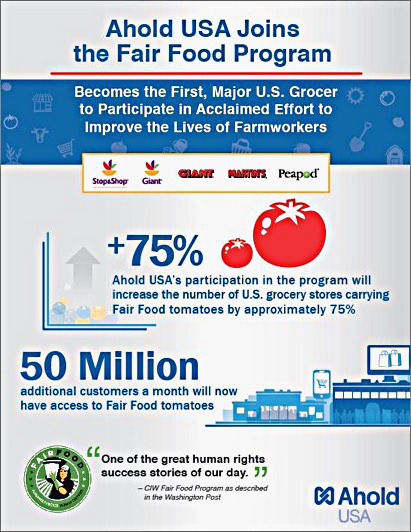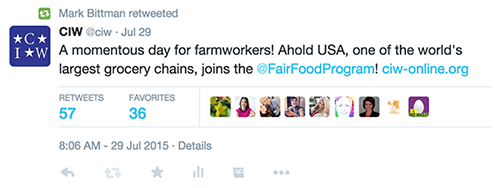
Take Part: “Buying ethical tomatoes just got a whole lot easier”…
Wednesday’s big announcement of the CIW’s newest Fair Food agreement caused quite a stir in the media, mainstream and otherwise, as Ahold became the first mainline grocer to join the award-winning Fair Food Program. From the Washington Post to Eva Longoria, everyone had something to say about the breakthrough agreement. With a media round-up this big, we might as well just roll our sleeves up and dig into it, so away we go…
First up, the Associated Press sent the story out to hundreds of papers and television stations across the country. Here, from the Seattle Post Intelligencer, is an example of the wire story than ran from Portland, Maine, to Portland, Oregon:
IMMOKALEE, Fla. (AP) — A major U.S. grocery company joined an initiative Wednesday that requires its Florida tomato suppliers to increase farmworker pay and protect workers from forced labor and sexual assault.
The Coalition of Immokalee Workers announced that Ahold USA is America’s first major grocer to join the group’s Fair Food Program…
… Florida tomato suppliers in the Fair Food Program pass on to their buyers a penny-per-pound of tomatoes pay increase for farmworkers. They also must have zero tolerance for forced labor and sexual assault and put in place a mechanism for resolving labor disputes between growers and farmworkers. The program also requires growers to allow farmworkers to form health and safety committees on each farm. Read more
The Washington Post contributed its own angle on the story, asking the question “why are worker rights so far behind environmental growing practices as far as making it onto grocery store shelves?” If you ask Post columnist Lydia DePillis, it has something to do with the complexity of ensuring compliance with human rights standards day in and day out if, as is the case with the Fair Food Program, enforcement really matters:
In September, you’ll have some new assurances about the tomatoes you buy from the 780 Giant Foods and Stop & Shop stores that pepper cities in the Northeast and Mid-Atlantic.
Ahold, the Dutch company that owns the grocery chains, has agreed to buy its Florida tomatoes only from farms certified for paying good wages and treating workers well. It’s among the biggest, but it’s far from the first: Retailers from Whole Foods to Wal-Mart have joined the Coalition of Immokalee Workers’ Fair Food Program in the past seven years, often after the group held protests outside their stores.
That’s pretty quick progress — for tomatoes. But you won’t find the Fair Food Program’s label on anything else in the produce section. It’s a far cry from the pervasiveness of the organic label, which is present as an alternative for nearly everything a shopper might want to buy, having been adopted by industrial agribusiness as a way to satisfy consumer desires.
The Coalition of Immokalee Workers is very slowly taking the tomato program to other states, and just starting to contemplate getting into pepper cultivation as a next move.
“Because we take the enforcement so seriously, we take a deep and incremental approach towards expansion, so when we say the protections are in place, they really are,” says Greg Asbed, the Coalition’s co-founder. Read more
Civil Eats, the widely-respected food blog, ran a piece by best-selling author Barry Estabrook (“Tomatoland”) that focused on the impact that the Ahold agreement might have on other grocery industry leaders, drawing on the Campaign for Fair Food’s past to predict the future:
… Ahold’s joining the Fair Food Program is the latest success in CIW efforts that began nearly two decades ago. The group’s victories have followed a clear pattern. The first overtures made by the CIW to the end buyers were inevitably stonewalled. Then, after a period of petitions, demonstrations, fasts, and other actions by the CIW—that often went on for years—one player in a business sector agreed to join the program, setting off a domino effect as its competitors scrambled to come on board. It took the CIW a decade to achieve its first major victory by convincing Taco Bell to join, and then only a few years for McDonald’s, Subway, and Burger King to agree. (Wendy’s is the only large fast-food chain that is still holding out.) Bon Appétit Management, which provides food service to universities, museums, and corporations, joined of its own accord, and was soon followed by its competitors Sodexo and Aramark. If the pattern continues, Ahold will be the first domino among the supermarket chains. Read more
The coverage in the mainstream media was extensive, and was echoed in the blogosphere, with great pieces on takepart.com, commondreams.org, and voces.huffingtonpost.com. And while bloggers gave the opinion in long form, the twitterverse was blowing up with people expressing their thoughts on the news in 140 characters or less. From Eva Longoria to Mark Bittman of the New York Times, commenters and supporters took to Twitter to make their voices heard on the steady march of the Fair Food movement:
. @FoodChainsFilm family celebrates a GIANT step for farmworkers: @AholdUSA’s @GiantFood & @StopandShop are joining @CIW @FairFoodProgram!
— Eva Longoria (@EvaLongoria) July 29, 2015

Congratulations to CIW! https://t.co/g5aJy1I27o
— Michael Pollan (@michaelpollan) July 29, 2015
Tremendous news for farmworkers: @AholdUSA, one of the world’s largest grocery chains, joins the @FairFoodProgram http://t.co/kepSosgY7v
— Kerry Kennedy (@KerryKennedyRFK) July 29, 2015
Thrilled to see @CIW announce @Ahold—7th largest US grocer—to start selling tomatoes where workers have decent jobs. http://t.co/5dOCpWvN3I
— Tracie M. McMillan (@TMMcMillan) July 29, 2015
And that’s a wrap!
As news of the Ahold agreement continues to spread through the media and across the supermarket industry, it also adds a distinct dose of optimism and conviction to the on-the-ground work of the Fair Food Program. From the worker-to-worker education teams currently meeting with hundreds of workers on tomato farms in the Eastern Shore of Virginia, to the FFSC audit crews soon to join them on this inaugural season of the expansion of the FFP to tomatoes beyond Florida, to the CIW staff and members back home in Immokalee laying the groundwork for the coming season of the FFP in Florida fields, we are all reminded by this newest agreement that there is indeed a vector to history, and its trajectory leads not backward toward the shameful exploitation and consumer disinterest of the past — as some might have it — but ahead toward a future of increasing dignity for farmworkers and ever greater transparency in our food system.
And that is a good thing, one for which we will continue to work, now with that much more vigor and leverage, thanks to the growing partnership for farm labor justice that is the Fair Food Program.
